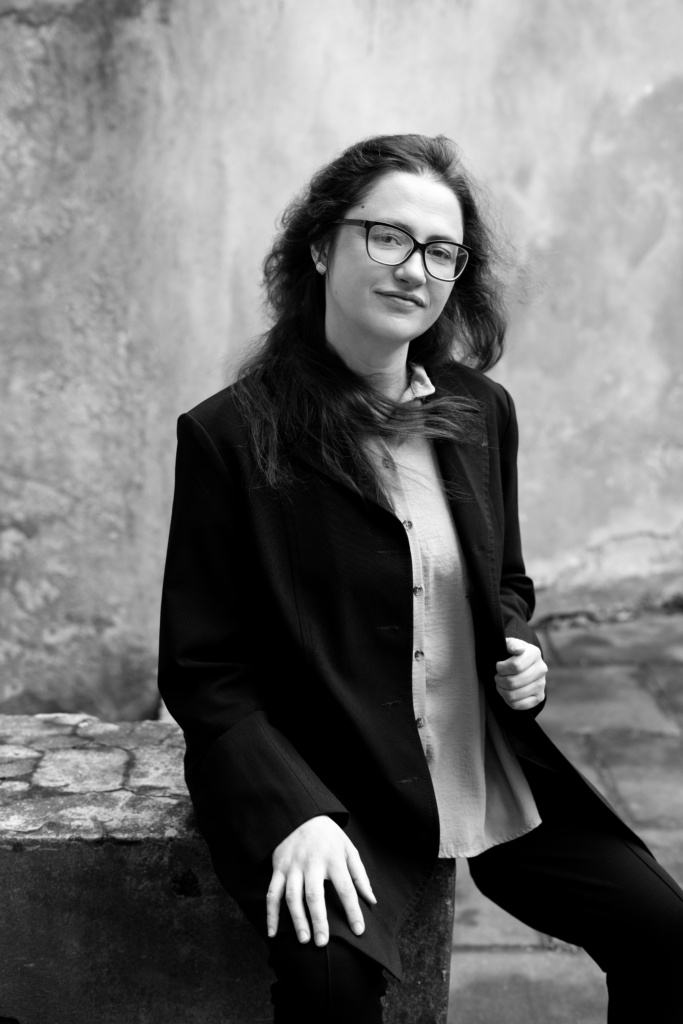“Music, I think, is an inevitable part of the human condition, it is the most powerful learning tool for understanding and experiencing how the many layers and dimensions of our life, societies and states of mind interact. Through imagination and experimentation I try to stretch the understanding of what we, as humans, are capable of, where we can grow, and I communicate these ideas to my audiences.“ – Rūta Vitkauskaitė
[The Composer] has perfectly mastered the art of playing the violin, so in the Concerto written by her, all the subtleties of the violin’s expression are extremely inventively and effectively interpreted in the notes, revealing the entire palette of the instrument’s sound. I have performed all the grand violin concertos, so, based on my experience, I can confidently say that Rūta Vitkauskaitė’s Concerto is definitely not inferior to the famous opuses of the violin repertoire.
Dalia Kuznecovaitė, violinist and the first performer of the piece, article by Elvina Baužaitė, Muzikos Barai, 2024The composer revealed the entire palette of the instrument's technical capabilities and emotional-musical colors - from the powerful sound of "broken" chords to the most delicate glissando, col legno (playing with a wooden bow part), ricochets and harmonics. All this colorful bouquet floated out of the deep, transcendental musical content of R. Vitkauskaitė's violin concerto. I have not heard another Lithuanian work of such duration and quality for the violin.
Vitoldas Rimkus, imdependent reviewer, Muzikos Barai, Muzikos Antena, 2024Song of the Shadows, brought the audience – inclusion this reviewer – into active, participative conversation with soprano and cello performers Stephanie Lamprea and Jessica Kerr, utilising invited soft vocal incursions and found instruments at the beginning and end of the piece. Evoking the haunting mystery of the Hebrides through Gaelic incantations and blessings, this part-hymn and part-sonic exploration created an enchanted circle of sound and resonance.
Simon Barrow, Edinburgh Music Review, 2025A substantial piece of theatre , Song of the Shadows required extreme virtuosity from both players to conjure up a heady brew of magic spells and benedictions. Involving the audience directly in the material was a bold stroke that succeeded in heightening the intensity of the presentation and making listeners feel personally connected with the composer’s vividly dramatic setting.
Paul Conway, Musical Opinion, 2025The composer knows how to write for an orchestra. The score is full of pages, when the music breathes freely, we hear the sounds of nature with the wonderful voices of birds. But the world is also full of cruel events and tragedies, echoes of which can also be heard in R. Vitkauskaitė’s work.
Živile Ramoškaitė, music critic, lrytas.lt, 2024I just want to say how much I have appreciated your leadership and all the wonderfully creative and open projects that you have directed during the time I've known you. I will really miss your touch with these things - you bring a lovely blend of artistic excellence and personal warmth.
Sheena Phillips, composer, 2024
Rūta Vitkauskaitė: Violin Concerto
Film by Ilmė Vyšniauskaitė, featuring soloist Dalia Kuznecovaitė, and the premiere at the Lithuanian National Philharmonic as part of Gaida Festival
Rūta Vitkauskaitė: Walking Opera
Film by Ilmė Vyšniauskaitė, featuring excepts from Walking Opera in Notting Hill
Composers on Air: Reflections on the Music and Life of Rūta Vitkauskaitė
(a conversation with True Rosarchi)
Rūta Vitkauskaitė: Konnakol, Canntaireach and Collaborative Composing. Ear to the Ground podcast, Scotland
(a conversation with Aileen Sweeney)
Rūta Vitkauskaitė’s Violin Concerto is a new, unheard sound in the Baltic violin tradition. I simultaneously hear and recognize the roots from which the musical contexts grew: Jewish, Lithuanian. I hear a modern city resonating with multinational traditions, ethnographically motivated, but unquoted, in which, surrounded by the forebodings and threats of an anxious age, a person lives and creates. The reflection on the city and the person becomes the central axis for me, a fantastically sensitive and technically mature violin drowning in the complexity of the orchestra, but dictating its own color, and keeping dialogue with the orchestral musicians.
Modestas Pitrenas, chief conductor and artistic director of the Lithuanian National Philharmonic, 2024